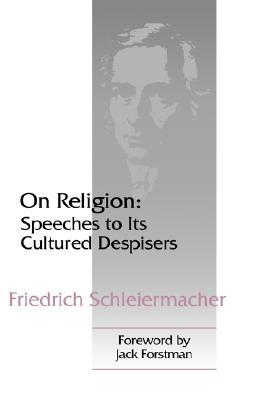 Friedrich Schleiermacher's On Religion: Speeches to Its Cultured Despisers (1799) (online here) is a hallmark of Liberal Protestantism, and coupled with his magnum opus, Glaubenslehre (The Christian Faith) he has produced the two most significant works of Liberal Theology and he remains as the apex of the entire system even to today. Schleiermacher is also well known for his Life of Jesus and Commentary on Romans and many of his Letters. On Religion: Speeches to Its Cultured Despisers is commonly referred to as Addresses On Religion or even as Addresses for short (viz. henceforth).
Friedrich Schleiermacher's On Religion: Speeches to Its Cultured Despisers (1799) (online here) is a hallmark of Liberal Protestantism, and coupled with his magnum opus, Glaubenslehre (The Christian Faith) he has produced the two most significant works of Liberal Theology and he remains as the apex of the entire system even to today. Schleiermacher is also well known for his Life of Jesus and Commentary on Romans and many of his Letters. On Religion: Speeches to Its Cultured Despisers is commonly referred to as Addresses On Religion or even as Addresses for short (viz. henceforth).
"A God without wrath brought men without sin into a kingdom without judgment through the ministrations of a Christ without a cross." - H. Richard Niebuhr, The Kingdom of God in America, pg 193.
Addresses is an apologetic to the non-religious educated peoples who have rejected Christianity and Religion entirely due to the philosophical ideas conceived by the Enlightenment Theologians. In my edition, edited by Jack Forstman, a short background introduction tells the sympathetic story of Schleiermacher, the lone religious martyr of the Church, who seemingly against all reason continued to attend the Church faithfully when all of his peers had abandoned such archaic nonsense (I'm being facetious). At social gatherings, especially with tea, Schleiermacher maintained praises of the Church and advocated it against all his friends and acquaintances, until at last he was persuaded to write down his arguments (in all humility) to be used as an apologetic for the Church (i.e. Liberal Protestantism). And such so is how Addresses was given birth.
The edition of Addresses that I've read was revised by Schleiermacher after he completed his Christian Faith and now includes notes of explanation after each of the five speeches. Many of these footnotes point to Schleiermacher's Christian Faith for fuller exposition. Schleiermacher is the most difficult theologian I have ever read because each sentence is packed full of meaning and detail its very difficult to read his books without meditating on each sentence, and this makes it very difficult to summarize or even nail down exactly what Schleiermacher is saying. I'm reading Addresses primarily because it is a source document to so many other books I've read and it is immensely influential and defining an epoch in theological inquiry (even if the entire system is heterodox), and lastly I'm reading him to try to understand the foundations of Karl Barth's Church Dogmatics.
Of the five speeches in Addresses, the third speech is particularly illuminating in understanding Schleiermacher's god that is defined as "a feeling of absolute dependance." Schleiermacher derives his system from a dialetic between knowing and doing (ie. activity) that produces feeling. Knowing as thesis, Doing as antithesis and Feeling as synthesis (think Hegel). So the complete synthesis that results in true Feeling is known as Piety, and the result of true Piety is a "feeling of absolute dependance" (which is Schleiermacher's definition of god). The realm of Morality and Ethics subsists in Doing and Activity, so it is inferior to Piety and Feeling because it lacks Knowledge. With this starting point, Schleiermacher in Addresses throws off all of orthodox Christianity and recreates an entire new system that he defends to his Cultured friend, but the full proof of the system is not in this book but referred to in his Christian Faith.
Schleiermacher is not an enemy of Christianity like Feuerbach or David Strauss, because he truly believed he was a defender of the faith. Considering his presuppositions many of the arguments are quite amazing and original, which is why even B.B. Warfield called Schleiermacher a genius. Schleiermacher even had the ability to take clear texts of the Holy Scriptures and flip their plain meanings to the very opposite of what they contained, demonstrating his great hermeneutical skills.
Schleiermacher is someone we may learn from but also pity. He has insights of great attribution but is not a place where we remain for long (like the tip of a icy volcano), and possibly only look back up from a distance as something of wonder, and yet wonder at its potential of its apocalyptic destructive power. So my concluding question is "if there is such thing as Natural Revelation, does Schleiermacher represent its greatest achievement? or is he only another bastardization of orthodox Christianity?" Probably the later.



January 11th, 2023 - 22:54
I want to read more about five speeches on religion.